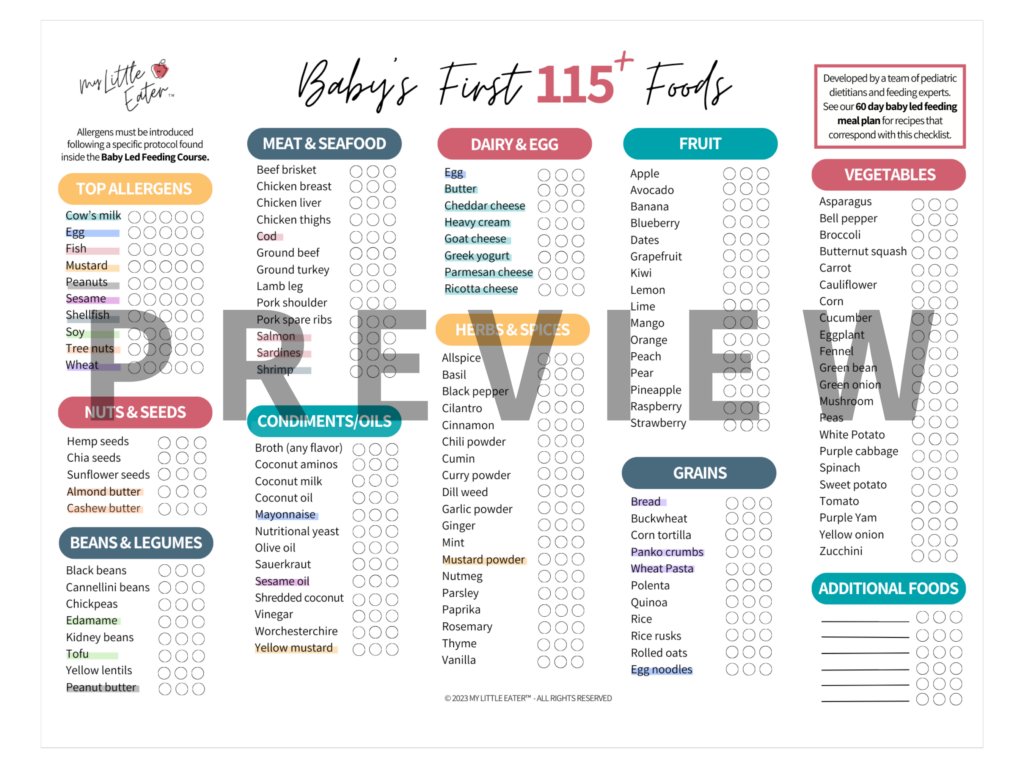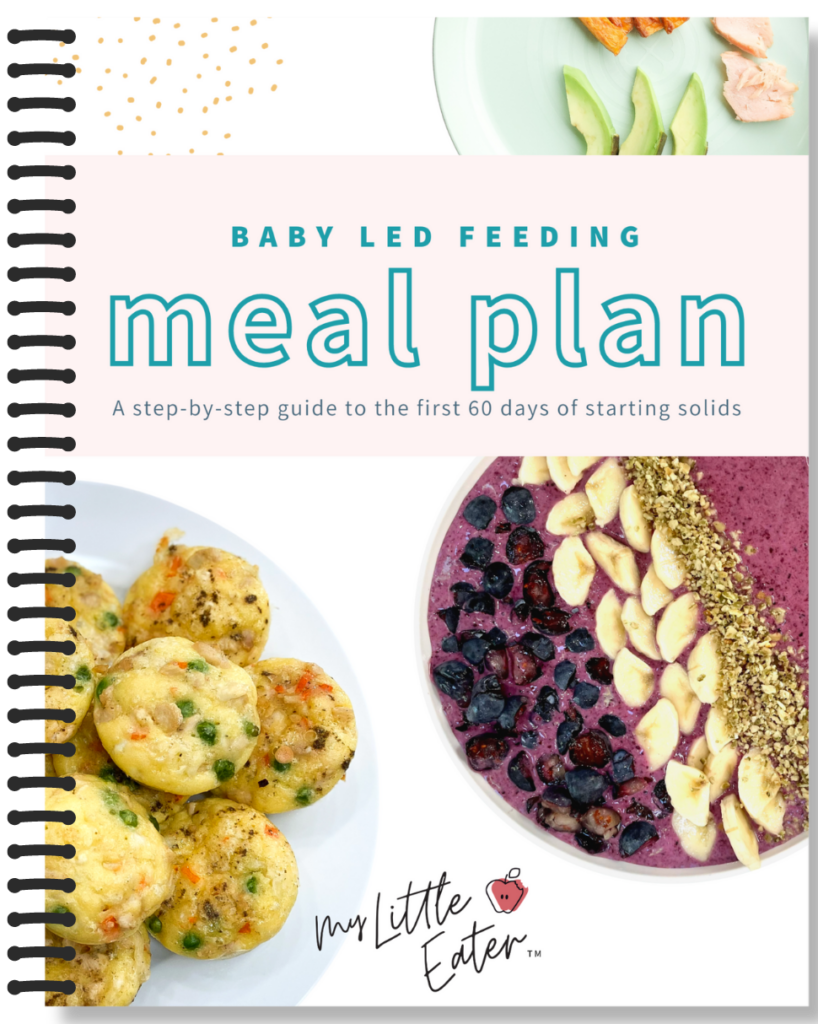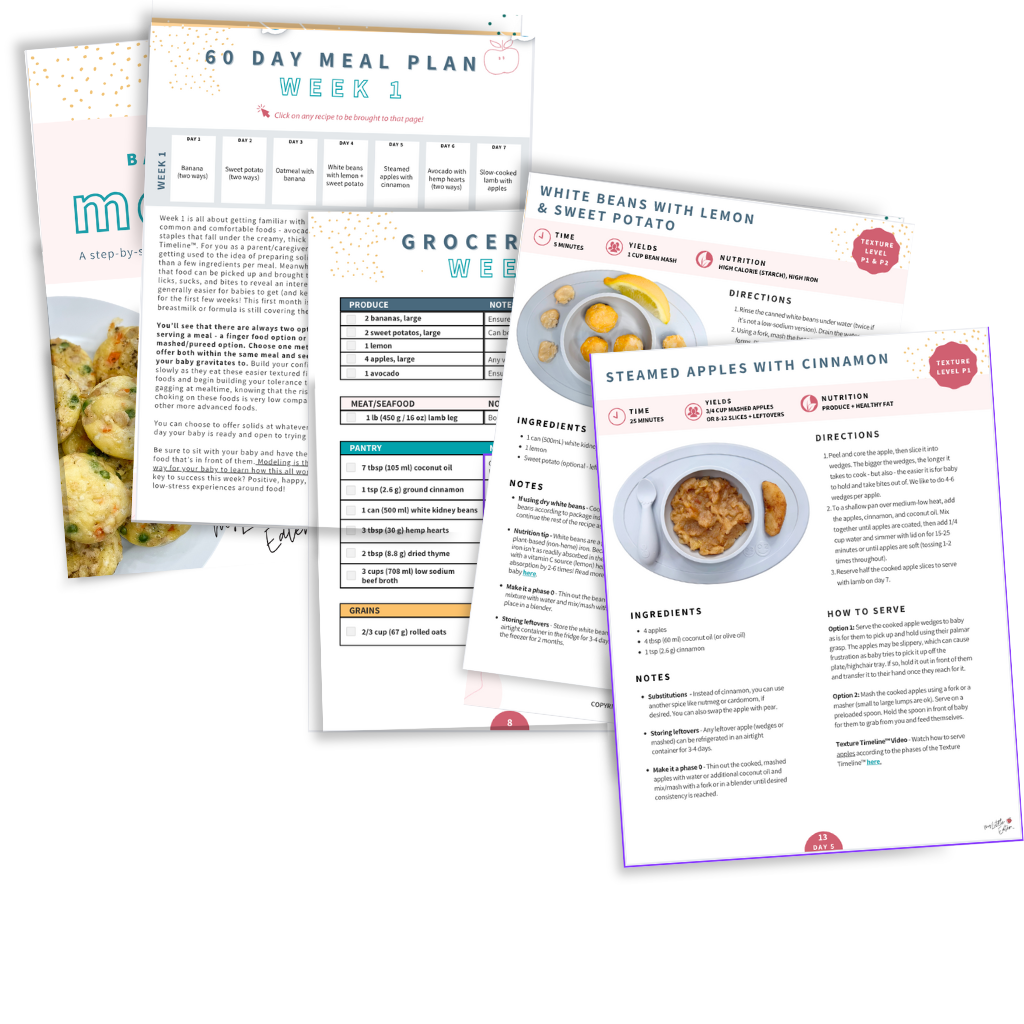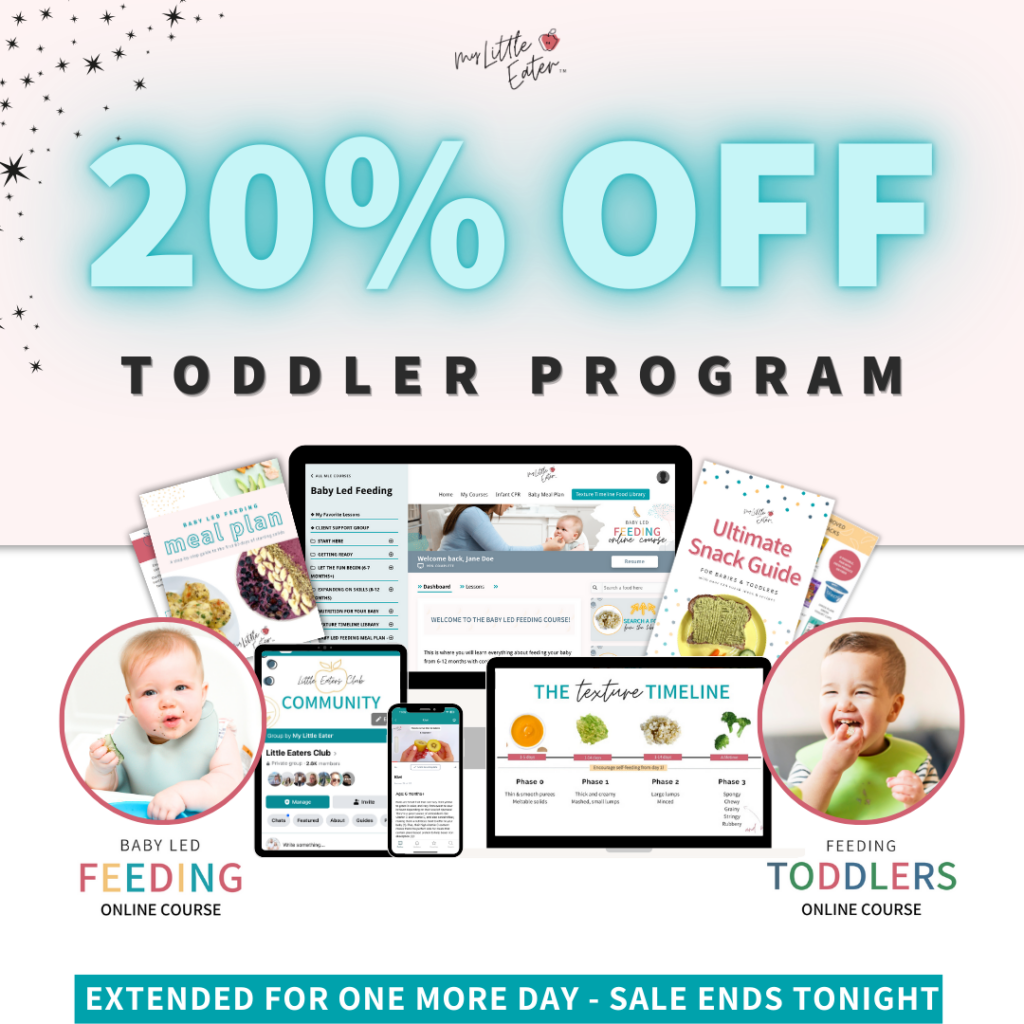
There’s still a lot of confusion out there when it comes to knowing the best time to start solids. Some parents are being instructed to start as soon as their baby shows an interest in food. Others go strictly by age, and yet others advise that solids aren’t even that important to start prior to one year old! It’s hard to know what’s right when even doctors give conflicting information sometimes, and you want to make sure that you’re doing what’s safest for your baby.
So let’s dive into the most updated recommendations and get the real answer!
What the health experts say

Regulatory bodies like the World Health Organization, Health Canada and the American Academy of Paediatrics all agree – it’s best to wait until your baby is around six months of age before offering any food other than breastmilk. This means…no cereal in the bottle, no purees, no finger foods, no non-milk beverages…nada.
So why do the experts use vague descriptions like “around” 6 months?
Truth be told…it’s less about age and more about when your baby shows all of the developmental signs of readiness. Wondering what those are? I’ve got you covered!
The developmental signs of readiness to start solids include:
- The ability to sit upright independently
- Good head and neck control
- The ability to reach for objects and bring them to their mouth with precision
- Showing interest in food!
- Diminished tongue thrust reflex
- And, the baby’s ability to close their lips around a spoon, hold food in their mouth (at least partially), and swallow.
Once babies show all of the signs of readiness…you’re off to the races! We want to wait until all of these signs are present for safe, healthy, and effective feeding. Simply showing an interest in food is not enough, no matter how cute your baby looks when they beg! Having all of the signs present usually happens around six months. For premature babies, it may take even longer for these signs to emerge.
TIP: Start when your baby’s fully ready vs. when you’re eager to start. I know it can be hard to resist (baby’s first food is an exciting milestone), but stick with me to see why I say this.
Click here for a free checklist to post to your fridge with the developmental signs of readiness!
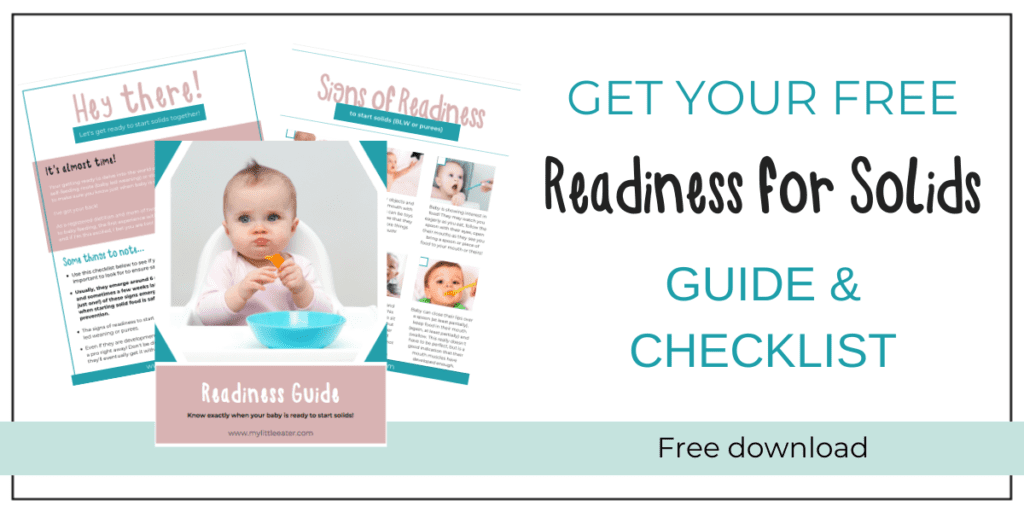
Risks of starting solids too early
Many people (including many doctors), still believe that introducing solids before significantly before 6 months of age is appropriate and even encouraged, thinking it will help with things like sleep, growth, and satisfying the interest in food your baby is showing.
Guess what? Not only is this not true, but too early an introduction can be associated with negative risks!
Here’s why…
STARTING SOLID FOODS BEFORE SIX MONTHS CAN INCREASE THE RISK OF CHOKING
If your baby is not meeting the developmental signs of readiness, which is more likely if you’re offering solids before 6 months, there is an increased risk of choking. Not being able to sit upright independently, and accept and manipulate food on the tongue, means they’re much more likely to have food get lodged in their airway. It will be much easier for both you and your baby to enjoy the experience of introducing new foods if you wait for these signs. Less risk for your baby means less stress for you!
EARLY INTRODUCTION OF SOLID FOODS CAN CAUSE BABIES TO DRINK LESS THAN THE RECOMMENDED AMOUNT OF BREAST MILK OR FORMULA
Sometimes I hear health professionals recommending not only to start solids too early, but to start them on 3 meals a day, right away! Even with only 1-2 meals a day, you may be running the risk that your baby will begin to decrease the amount of milk they’re drinking. We still want milk to be the primary source of calories (especially up to 10 months of age). Decreasing the amount of milk in your baby’s diet can not only lead to dehydration, but they also miss the opportunity to get beneficial nutrients, antibodies, probiotics, and a myriad of other nutritional benefits that breast milk and formula provides. This is why we recommend starting your baby off with only 1-2 “meals” per day.
Tip: Remembering that the main source of your baby’s nutrition will be milk until they turn one year old, allows you to see the other important and essential benefits of mealtime. Use this time to experiment with new flavours and textures with your baby! It can be exciting for both of you, PLUS you’ll begin to learn more about your baby while seeing their little personality emerge.
STARTING SOLID FOODS AROUND 3 OR 4 MONTHS CAN LEAD TO AN INCREASED RISK OF OBESITY, AND DIABETES
Though the reason isn’t 100% clear as to why this is the case, there are several possible contributing factors that can lead to these health issues. It could be that solid food introduction before 6 months is linked to earlier cessation of breastfeeding (which is linked with lower BMI). Secondly, babies tend to be overfed when introduced to purees, which is typically what is offered when starting solid foods this early. There are also changes in the gut microbiome that occur, or it could be for some other, yet to be determined, reason.
INTRODUCTION OF SOLID FOODS AT 4 MONTHS OR YOUNGER SHOWS INCREASED RISK OF DIGESTIVE ISSUES AND ECZEMA
Your baby’s immune and digestive system isn’t fully equipped to properly process solid food and all of the new proteins, fats, and carbohydrates that come with it. This can sometimes cause digestive issues such as increased gas, constipation, or an upset stomach. Babies this age also have a somewhat “leaky gut”, meaning large proteins from food can pass through their gut lining easily and cause allergic reactions, such as eczema. This is not fun for anyone! And if your baby is uncomfortable every time they eat, what is meant to be a happy, exciting experience can quickly become a negative one for the whole family.
BABY WON’T BE DEVELOPMENTALLY READY TO EAT NON-LIQUID FOOD
Research shows that babies aren’t developmentally ready to manage semi-solid, or solid food, until around 6 months. A purely liquid diet of breastmilk or formula is their dream menu until then, so don’t worry, they’re not missing out!
The only exception that may require introducing solids around 4 months is for babies who have a high risk of developing a food allergy due to their family history. In certain cases, your doctor may advise you to introduce an allergenic food, in very small amounts, to your baby in order to build up a tolerance. This does not mean you’re introducing all solids, or full meals, just enough of the allergenic food to check for a reaction over multiple exposures.
What about waiting longer than 6 months?

Research shows that waiting longer than around 6 months to start solids may also have some negative side effects. We often hear the phrase “Food before one is just for fun,” but really… it’s for much more than that! Introducing a variety of textures and flavours to babies early on (meaning again: when they show the developmental signs of readiness) is very important for proper development. Starting solids is not just about feeding your baby, it’s also about teaching your baby! You may not be ready to let go of the infant phase and embrace this new journey (I know it happens much faster than we want), but here’s why you shouldn’t wait too long to start this next chapter…
DELAYED SOLID FOODS INTRODUCTION INCREASES THE RISK OF IRON DEFICIENCY IN BREASTFED BABIES
By around 6 months, babies need supplemental iron from food to start replenishing their depleting iron stores. For breastfed babies especially, delaying the introduction of solids can lead to iron deficiency, as breastmilk doesn’t contain enough iron to meet their needs. Introducing high iron foods (beans, lentils, eggs, red meat, rice cereal, etc.) twice a day gives babies the nutritional iron they need!
WAITING TO INTRODUCE, OR REGULARLY OFFER, SOLID FOODS CAN LEAD TO DELAYS IN ORAL MOTOR FUNCTION
A baby that’s introduced to multiple textures early and often is able to develop their jaw strength, chewing technique, the ability to manipulate their food with their tongue, and more feeding related skills. The longer they’ve been on finger foods and lumpy textures, the more practice they get, and the more practice they get, the stronger and more advanced their oral motor movements become. Remember, practice makes progress!
WAITING WILL INCREASE THE RISK OF DEVELOPING AN AVERSION TO SOLID FOODS (ESPECIALLY THOSE WITH A VARIETY OF TEXTURES)
Waiting to introduce solids also means that your baby isn’t accustomed to having food in their mouth. Therefore, they’ll be missing out on the sensory experience of food (which can be something us adults forget about!). In addition, their gag reflex will be very strong, resulting in excessive gagging and causing even more of an aversion to food. Whether they get a lot of that food in or not isn’t the priority. The process of just playing and getting food exposure is incredibly beneficial. There’s no room for a “don’t play with your food” rule when you start this process! More playing equals more learning. In fact, research shows that babies who haven’t been introduced to various textures, or lumpy purees, by 9 months are at a greater risk for picky eating and feeding problems at 7 years old. This is compared to those who were fed a lot of variety of textures between 6 and 9 months.
DELAYING THE INTRODUCTION OF ALLERGENIC FOODS PAST 6 MONTHS INCREASES RISK OF ALLERGY DEVELOPMENT

In 2019, the Canadian Paediatric Society updated their guidelines to recommend introducing the common allergens as close to 6 months as possible. This update is based on a revealing study that showed that an earlier introduction of peanuts to high-risk infants helped prevent the development of a peanut allergy. As mentioned above, introduction at 4 months may be the protocol your doctor gives you based on your baby’s allergy risk, but most other babies should be introduced around 6 months, and not much later. I know it can make parents nervous to introduce these foods, but trust me on this one, it’s worth it.
All in all, always go by this rule:
Go off of what your baby can DO versus how old they are
The right time might be just after 5 months for some, or maybe it’s at 7 months for others. Keep in mind that with preemies, or for those babies who have specific instructions from their doctor due to a medical reason, it may mean an earlier or later start. Although, these are exceptions.
And if you’re unsure about how to prepare your baby for solids, what types of food to offer, how to offer them, and how to feed in a way to raise an adventurous eater, you need to check out the Baby Led Feeding Online Course! I know first hand that trying to piece together all the misinformation found on the internet is not only wasting time, but can cause undue stress. For a step-by-step plan with videos, recipes and more, the course will 100% help!
If you want to learn more about these readiness signs and the common misunderstandings about them, listen to my podcast episode here! Also, feel free to DM us on Instagram, or email us your questions and feedback. I would love to know how you’re doing with your baby’s journey to starting solids.
 Last day - 20% off toddler program - code Toddler20
Last day - 20% off toddler program - code Toddler20 
